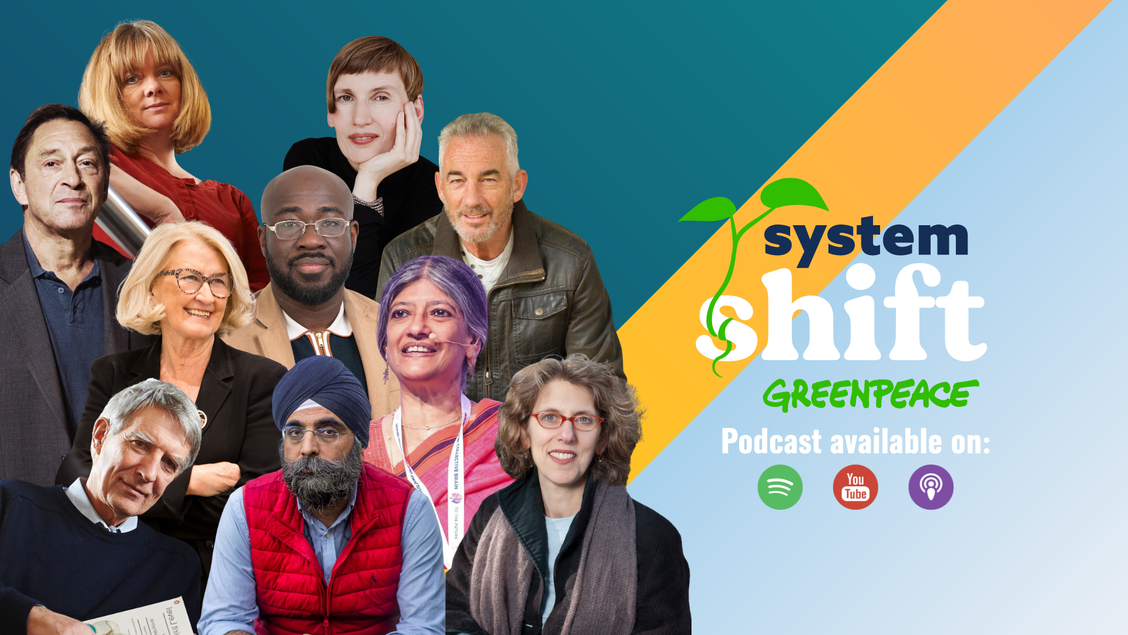Earth Overshoot Day: An abundance of ideas to fix the rigged economic system – Greenpeace International
Earth Overshoot Day: An abundance of ideas to fix the rigged ... Greenpeace International


Sustainable Development Goals and Earth Overshoot Day

Earth Overshoot Day serves as a reminder that humanity’s actions are pushing the limits of our planet’s ability to sustain life. According to the Global Footprint Network, Earth Overshoot Day represents the point at which human activities exceed the Earth’s capacity to regenerate its resources. To create a sustainable future, it is crucial to recognize the interconnectedness of nature, people, society, and the economy.
SystemShift Podcast: Exploring Economic System Change
Greenpeace Nordic has gathered a group of global experts in economic system change for Season 1 of the SystemShift podcast. This podcast series aims to identify the root causes of our current harmful economic system and propose transformative solutions. By addressing socio-economic issues, climate change, and biodiversity loss, these experts offer creative solutions that can lead to a more sustainable future.
Root Causes: Addressing the Challenges
Growth Vs Sustainability
One of the key root causes identified by the podcast experts is the prevailing paradigm of infinite economic growth. Tim Jackson, Director of the Center for the Understanding of Sustainable Prosperity, explains how this pursuit of ever-greater GDP ignores the true costs of environmental degradation and social inequality.
- Solution – Redesign: Jackson advocates for an alternative economic system that shifts away from relentless growth-focused mindsets and prevents activities such as fossil fuel extraction.
- Solution – Regenerative Concept: Eva Von Redecker introduces a regenerative concept of environmental freedom, emphasizing the right to be free from pollution and the entitlement to a clean and healthy environment.
The Future of Work
The focus on infinite growth has also led to outdated notions about work. Juliet Schor, Professor of Sociology, explains how excessive work hours reduce efficiency and productivity while devaluing essential aspects of life, such as the care economy and quality time with loved ones.
- Solution – Reduce: Schor argues for reduced work hours and increased leisure time to benefit well-being, productivity, and the environment by reducing global carbon emissions.
- Solution – Rebalance: Jayati Ghosh, Professor of Economics, calls for greater voice and power for care workers and unpaid caregivers to address the undervaluing of care work compared to the influence of financial institutions and corporations.
The Hidden Economic System
The experts highlight the destructive aspects of the hidden economic system, which lacks public and democratic control over money creation and the profit-driven global monetary system. Ann Pettifor, Director of Policy Research in Macroeconomics, emphasizes the need for greater democratic control over money production and the re-regulation of global banking.
- Solution – Reregulate: Pettifor calls for the reintroduction of capital controls, re-regulation of global banking, re-nationalization of pensions, and the restoration of political and economic power to elected assemblies.
Ongoing Impacts of Colonialism
Kojo Karam, lecturer at the School of Law, explains how the colonial legacy continues to perpetuate socio-economic inequalities in the current economic model. The experts call for the removal of tax havens and increased taxation on wealth and multinational corporations.
- Solution – Taxation: Kojo Karam and Kate Pickett advocate for the immediate removal of tax havens and ensuring multinational corporations pay their fair share of taxes.
Effects of Inequality
Kate Pickett and Richard Wilkinson, academics and authors, highlight the detrimental effects of inequality on health, relationships, well-being, and the environment. Jayati Ghosh emphasizes the need for a feminist economics framework that values the care economy and proposes a Universal Basic Income system to distribute resources equitably.
- Solution – Feminist Economics: Ghosh calls for a framework that recognizes the undervalued care economy and its unpaid form.
- Solution – Our Shared Commons: Guy Standing proposes reviving the concept of shared wealth and implementing a Universal Basic Income system to counter fiscal austerity and neoliberal policies.
Choosing a Sustainable Future
An ever-increasing ecological footprint is not inevitable. It is essential to urge governments to regulate corporations and financial markets to prevent further exploitation of our planet. The ideas presented in the SystemShift podcast are just a glimpse into the deep discussions on economic system change. Join us in reimagining a sustainable future.
Attila Kulcsar is communications lead with Greenpeace’s Money for Change campaign.
SDGs, Targets, and Indicators
| SDGs | Targets | Indicators |
|---|---|---|
| SDG 8: Decent Work and Economic Growth | Target 8.5: By 2030, achieve full and productive employment and decent work for all women and men, including for young people and persons with disabilities, and equal pay for work of equal value | Indicator not mentioned in the article |
| SDG 10: Reduced Inequalities | Target 10.1: By 2030, progressively achieve and sustain income growth of the bottom 40 percent of the population at a rate higher than the national average | Indicator not mentioned in the article |
| SDG 12: Responsible Consumption and Production | Target 12.2: By 2030, achieve the sustainable management and efficient use of natural resources | Indicator not mentioned in the article |
| SDG 13: Climate Action | Target 13.1: Strengthen resilience and adaptive capacity to climate-related hazards and natural disasters in all countries | Indicator not mentioned in the article |
| SDG 16: Peace, Justice, and Strong Institutions | Target 16.6: Develop effective, accountable, and transparent institutions at all levels | Indicator not mentioned in the article |
1. Which SDGs are addressed or connected to the issues highlighted in the article?
- SDG 8: Decent Work and Economic Growth
- SDG 10: Reduced Inequalities
- SDG 12: Responsible Consumption and Production
- SDG 13: Climate Action
- SDG 16: Peace, Justice, and Strong Institutions
2. What specific targets under those SDGs can be identified based on the article’s content?
- Target 8.5: By 2030, achieve full and productive employment and decent work for all women and men, including for young people and persons with disabilities, and equal pay for work of equal value (under SDG 8)
- Target 10.1: By 2030, progressively achieve and sustain income growth of the bottom 40 percent of the population at a rate higher than the national average (under SDG 10)
- Target 12.2: By 2030, achieve the sustainable management and efficient use of natural resources (under SDG 12)
- Target 13.1: Strengthen resilience and adaptive capacity to climate-related hazards and natural disasters in all countries (under SDG 13)
- Target 16.6: Develop effective, accountable, and transparent institutions at all levels (under SDG 16)
3. Are there any indicators mentioned or implied in the article that can be used to measure progress towards the identified targets?
No, the article does not mention or imply any specific indicators that can be used to measure progress towards the identified targets.
SDGs, Targets, and Indicators
| SDGs | Targets | Indicators |
|---|---|---|
| SDG 8: Decent Work and Economic Growth | Target 8.5: By 2030, achieve full and productive employment and decent work for all women and men, including for young people and persons with disabilities, and equal pay for work of equal value | Indicator not mentioned in the article |
| SDG 10: Reduced Inequalities | Target 10.1: By 2030, progressively achieve and sustain income growth of the bottom 40 percent of the population at a rate higher than the national average | Indicator not mentioned in the article |
| SDG 12: Responsible Consumption and Production | Target 12.2: By 2030, achieve the sustainable management and efficient use of natural resources | Indicator not mentioned in the article |
| SDG 13: Climate Action | Target 13.1: Strengthen resilience and adaptive capacity to climate-related hazards and natural disasters in all countries | Indicator not mentioned in the article |
| SDG 16: Peace, Justice, and Strong Institutions | Target 16.6: Develop effective, accountable, and transparent institutions at all levels | Indicator not mentioned in the article |
Behold! This splendid article springs forth from the wellspring of knowledge, shaped by a wondrous proprietary AI technology that delved into a vast ocean of data, illuminating the path towards the Sustainable Development Goals. Remember that all rights are reserved by SDG Investors LLC, empowering us to champion progress together.
Source: greenpeace.org

Join us, as fellow seekers of change, on a transformative journey at https://sdgtalks.ai/welcome, where you can become a member and actively contribute to shaping a brighter future.







